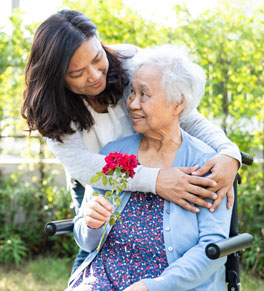Understanding sundowning triggers is key to prevention

Sundowning – the state of confusion and panic that older people often experience as daylight fades during the late afternoon and evening – can be unsettling for both caregivers and their loved ones.
Sundowning affects up to two-thirds of people with dementia, but it can happen to any older person.
Treating sundowning
Because sundowning has a number of potential causes, treatment should involve multiple approaches, recommends UCI Health geriatrician Dr. Lisa Gibbs, medical director of Senior Health Services and chief of the UCI School of Medicine’s Division of Geriatric Medicine & Gerontology.
“The best initial treatment to sundowning is nonpharmacologic,” she tells U.S. News & World Report. Avoiding medications is crucial, she says, to avoid drug-to-drug interaction and the use of multiple medications at once.
With some adjustments, it’s possible to manage symptoms. The first step, Gibbs says, is understanding what is triggering the episodes.
Preventing episodes
For example, she says, “if the pain from arthritis is a problem throughout the day, then treating the pain may alleviate the physical discomfort that can result in agitation or confusion.”
It’s also crucial to ensure that the person’s physical needs, such as sleeping and eating well, are being met.
Unfamiliar situations and events can also trigger fear or agitation. Gibbs suggests that caregivers create a daily structure for their loved one that can give them a sense of predictability and comfort.
“Prevention is key, if possible.”
Other causes
Additional triggers of sundowning may include:
- Insufficient sunlight exposure
- Medications
- Overstimulation
- Changes in production of melatonin, the “sleep hormone”
- Sleep disorders
When medication is deemed appropriate, these may include melatonin, anti-anxiety medication, antidepressants or antipsychotics.
Caregiver mental health
Gibbs advises caregivers to monitor their own stress and make time for themselves, too.
“Individuals with dementia may mirror caregiver feelings, whether calmness, stress or frustration. Caregiver self-care is just as critical.”
Explore further
Browse more blog posts by topic.




